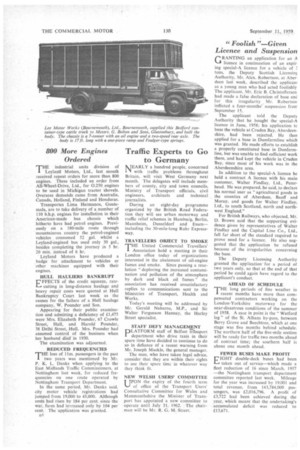• 800 More Engines Ordered
Page 66

If you've noticed an error in this article please click here to report it so we can fix it.
THE industrial units division of Leylant Motors, Ltd., last month received repeat orders for more than 800 engines. These included an order from All-Wheel-Drive, Ltd., for 0.250 engines to be used in Michigan tractor shovels. Overseas demands came from Australia, Canada, Holland, Finland and Honduras.
Transportes Lima Hermanos, Guatemala, are to take delivery of a number of 110 b.h.p. engines for installation in their American-made bus chassis which hitherto have had petrol engines. Previously on a 180-mile route through mountainous country the petrol-engined vehicles consumed 52 gal. whilst a Leyland-cngined bus used only 30 gal., besides completing the journey in 5 hr. 20 min. instead of 6 hr.
Leyland Motors have produced a badge for attachment to vehicles or other machines equipped with their engines.
HULL HAULIERS BANKRUPT
EFFECTS of the credit squeeze, ratecutting in long-distance haulage and heavy repair costs were quoted at Hull Bankruptcy Court last week as the causes for the failure of a Hull haulage company, W. Pounder and Son.
Appearing for their public examination and admitting a deficiency of £1,475 were Mrs. Elizabeth Pounder, 67 Crowle Street, Hull, and Harold Pounder, 38 Delhi Street, Hull. Mrs. Pounder had assumed control of the business when her husband died in 1930.
The examination was adjourned.
REDUCED FREQUENCIES THE loss of Urn, passengers in the past two years was mentioned by Mr. P. K. L. Danks when applying to the East Midlands Traffic Commissioners, at Nottingham last week, for reduced frequencies on one route operated by Nottingham Transport Department.
In the same period, Mr. Danks said. city motor vehicle registrations had jumped from 19,000 to 43,000. Although costs had risen by 184 per cent. since the war, fares had increased only by 104 per cent. The application was granted.




























































































































































